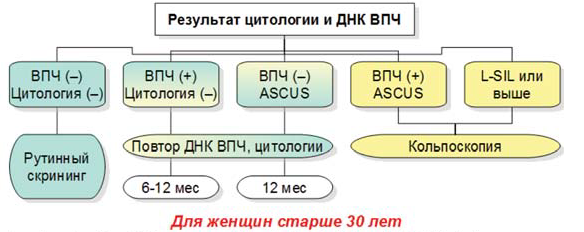Colon cancer

Oncology of the colon accounts for 6% of all cancers. Most often they suffer men aged 50 to 60 years. Diseases such as adenoma, diffuse polyposis and ulcerative colitis make the risk of cancer more. Some doctors even consider them as pre-tumor diseases. It is well known that in the case of diffuse polyposis, it is 100% of the time.
Clinic
The clinical picture and symptoms of colorectal cancer in the early stages are blurred, there are no manifestations of any bright symptoms. Only in the course of a thorough questioning of the patient can you identify a change in health, a decrease in appetite and a decrease in ability to work. Losing weight with cancer of the bowel is not often observed, on the contrary, patients can significantly increase weight.
In the future, signs of intestinal disorders begin to appear: a strong rumbling in the intestine, alternation of diarrhea and constipation, periodic cramping pains in the abdomen, not related to food intake. When narrowing the lumen of the colon, the tumor produces a visible uneven bloating. In the right parts of the colon, cancer causes anemia due to slow chronic blood loss.
Over time, signs of illness are increasing. In the most severe cases, there may be intestinal obstruction, severe bleeding. There are also risks of inflammatory complications( phlegmon, abscess, peritonitis).
Diagnosis
Sometimes, when an external examination of the patient, no signs of cancer are detected. Only with a significant cancer tumor size or in very thin patients can the tumor be probed with the hands through the abdominal wall. In the diagnosis of colorectal cancer, an important role is played by X-ray examination. Radiologist can determine the cancerous lesion of the colon even in the absence of clear clinical manifestations. The study is carried out using a contrast solution of barium given to the patient through the mouth or with an enema. Sometimes the relief of the intestinal mucosa in addition to the air introduced into its lumen is additionally studied.
Selection of patients for the examination is performed only after the analysis of clinical symptoms. Also, the results of the analysis of feces for the presence of blood in it, the carcinoembryonic antigens are determined in the blood. Ultrasound tomography( ultrasound) is performed to exclude metastases in the liver region. Laparoscopy is indicated in order to exclude the generalization of malignant cancerous processes.
Treatment of
Radical treatment of colon cancer is possible only by surgical methods. There are different variants of operations depending on the level and degree of location of the tumor. Preparation of the patient for surgery consists in a thorough phased purification of the intestine. A few days before surgery, the patient is transferred to an easy diet, for two days he is given castor oil and repeated enemas, including the night before the operation itself. Prophylactic for three days, a course of antibiotics and sulfamides.
After surgery, along with general measures to combat postoperative shock, intoxication and dehydration, the patient is assigned Vaseline oil. This laxative will not allow the formation of a dense feces traumatizing the seam line. From the second day it is allowed to drink, and then liquid food. After the first soft stool the patient will be transferred to a general diet.
Recurrences of colon cancer are rare. They can arise due to an incorrect operation. Then, in the absence of metastases, you will have to resort to a second operation.
Metastasis
Cancer in the colon metastasizes through the lymphatic tract, affects the lymph nodes, and then the entire group of nodes located along the abdominal aorta. Most often, hematogenous metastases occur in the liver. In the case of tumor germination of serous intestinal cages, the process begins in the peritoneum. It is usually accompanied by ascites.
Prognosis and prevention of
For colon cancer, the prognosis directly depends on its stage. In the absence of metastases in the liver and lymph nodes, the prognosis is relatively favorable - almost half of the patients are cured.
Patients from the risk group are subject to follow-up. Prophylaxis of cancer basically reduces the treatment of polyposis of the intestine and to the correct treatment of colitis. It is important not to allow its transition into a protracted, chronic form. Also, an important preventive measure is normalizing nutrition, reducing the consumption of meat products, and actively fighting constipation.



